#Custom CNC Machining Service
Explore tagged Tumblr posts
Text
Know About The Significance of CNC Machining Companies
An age of industrial accuracy like none before has arrived thanks to CNC machining. Traditional machining techniques sometimes require manual involvement, which might lead to irregularities and human mistakes. On the other hand, CNC machining uses computer-controlled instructions to accurately control tools and equipment. In addition to guaranteeing consistency in completed goods, this degree of precision also lessens the demand for frequent quality control inspections.
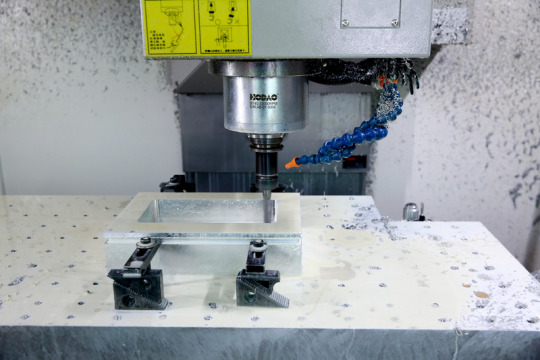
Unlimited Possibilities
CNC machining businesses provide a wide range of capabilities, from straightforward two-dimensional cuts to intricate multi-axis operations. This adaptability enables manufacturers to create complex geometries and forms that were previously thought to be impossible. CNC machining provides options for both sides of the spectrum, whether it's manufacturing a huge number of standardized components or developing prototypes with a specific design in mind.
Reduced Turnaround Times: The days of laborious hand setups and modifications in manufacturing are long gone. CNC machining services automate most of the manual work, streamlining the production process. Manufacturing lead times are greatly shortened as a result of this setup time reduction and the ability to conduct automated, uninterrupted operations. Now, businesses can react quickly to market needs and design modifications without compromising on quality or efficiency.
Cost-Effectiveness
The long-term advantages of CNC machining technology are without a doubt worth the initial financial outlay, which might be significant. Once set up, the devices can run independently with little assistance from humans. Reduced labor costs, fewer mistake rates, and improved resource utilization result from this. Additionally, the accuracy of CNC machining reduces material waste, which helps to reduce total costs.
CNC machining businesses are at the vanguard of innovation, according to Innovation Unleashed. They constantly push the limits of what is possible by integrating cutting-edge software, simulation tools, and additive manufacturing processes. Complex design creation and quick prototype iteration have enabled ground-breaking developments in industries including aerospace, healthcare, automotive, and electronics.
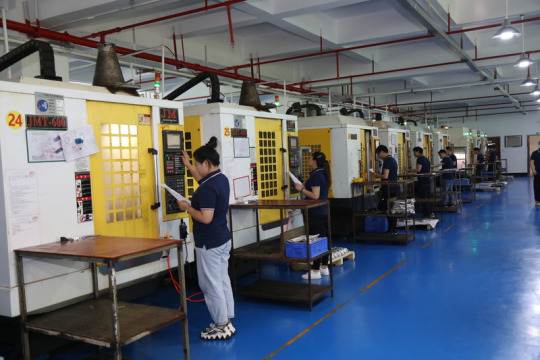
Personalization and Customization
Personalization and customization are crucial in today's consumer-driven environment. CNC machining companies that provide CNC machining meet this need by giving customers the freedom to design one-of-a-kind items or small batches that are suited to certain specifications. This degree of personalization boosts consumer satisfaction while also creating new market opportunities and specialized markets.
#CNC Machining#CNC Machining services#CNC Machining companies#Custom CNC Machining Service#Online CNC Machining Services#3 axis CNC machines
3 notes
·
View notes
Text

Best CNC Machining in Pune — ANJALI T. PRECISION
ANJALI T. PRECISION – Leading provider of CNC machining in Pune, delivering high-precision, reliable & cost-effective solutions for various industries.
#CNC Machining#Precision Machining#CNC Components#CNC Services Pune#High-Precision Engineering#Custom CNC Parts#ANJALI T. PRECISION
2 notes
·
View notes
Text
#lasercutting #cncprocessing #cnc #cncservices
#cnc milling service#cnc car parts#online cnc machining services#sheet metal fabrication#sheet metal processing services#custom sheet metal fabrication#cnc turning services#cnc machining services#online cnc precision machining
2 notes
·
View notes
Text
#ideal machined components#custom-cnc-aluminum-parts#aluminum machining near me#best-prototype-companies#aluminum machining service#precision-machined-components-manufacturers
0 notes
Text
Import Industrial Machinery
Import Service for Industrial Machinery to Indonesia Keenam International is an officially licensed freight forwarder based in Jakarta, Indonesia. We specialize in the importation of industrial machines from top manufacturing countries such as Germany, Japan, China, Taiwan, and South Korea. All shipments are processed legally and efficiently according to Indonesian Customs and Trade…
#CNC machine import#CNC Machine Indonesia#customs clearance industrial machines#freight forwarder Indonesia#import industrial machinery#Industrial Machine Import#Injection Molding Import#Keenam freight forwarder#legal freight services#Machine Import Indonesia#machine import service#packaging machine
0 notes
Text
IMPORT CNC MACHINES FROM JAPAN
Why Import CNC Machines from Japan? Japan remains one of the most trusted sources of high-precision CNC machinery globally. Indonesian manufacturers in automotive, aerospace, metal, and plastic industries frequently import CNC lathe machines, machining centers, and CNC milling machines from Japan for their accuracy, efficiency, and reliability. However, importing machines requires legal…
#CNC import Indonesia#CNC lathe import service#CNC lathe Japan#customs clearance CNC#customs CNC import Indonesia#HS code 8458#import CNC machine#Japan CNC import#Keenam International#legal freight forwarding#machining center import
0 notes
Text
Unlocking Innovation: How CNC Machining Prototyping Drives Custom Manufacturing Success
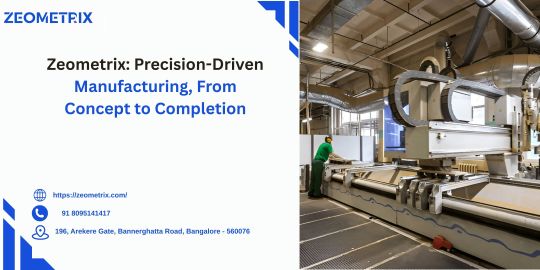
Summary
CNC machining prototyping enables rapid, precise product development. Custom CNC services offer tailored solutions, while local CNC manufacturing ensures faster turnaround, expert support, and high-quality parts across industries.
Introduction
In today’s fast-paced industrial landscape, innovation is the heartbeat of success. Whether you're a startup designing your first product or a well-established manufacturer developing the next big thing, the ability to rapidly and accurately turn ideas into functional prototypes is essential. This is where CNC machining prototyping comes into play—bridging the gap between concept and reality with unmatched precision and speed.
The rise of custom CNC services has revolutionized product development across a wide array of industries, from aerospace and automotive to consumer electronics and medical devices. Thanks to advancements in digital manufacturing, it’s now easier than ever to bring custom parts to life with tight tolerances, high repeatability, and a fast turnaround.
What Is CNC Machining Prototyping?
CNC (Computer Numerical Control) machining is a subtractive manufacturing process that uses computer-controlled tools to remove material from a solid block—typically metal or plastic—to form a part. CNC machining prototyping refers specifically to using this technology to create working models or proof-of-concept parts during the early stages of product development.
These prototypes are often used to test:
Design functionality and fit
Material performance
Manufacturability
User feedback and ergonomic testing
Because CNC machining offers high accuracy (often within microns), it allows engineers and designers to validate their ideas with real, testable components before committing to mass production.
Advantages of CNC Machining for Prototyping
1. Speed and Turnaround
Traditional prototyping methods, like casting or molding, often involve creating complex tooling or molds, which can take weeks or even months. CNC machining, by contrast, can produce a high-fidelity prototype in just a few days—sometimes even overnight.
2. Precision and Consistency
When you’re developing a part that requires tight tolerances—such as aerospace components or medical devices—precision is critical. CNC machines operate with extreme accuracy, ensuring that every dimension matches your CAD model perfectly.
3. Wide Material Selection
CNC machining can handle a wide range of materials including aluminum, stainless steel, titanium, and various plastics. This gives product developers flexibility to test different materials based on performance, weight, and cost.
4. Cost-Efficient Iterations
Because there's no need for custom tooling, it's much easier and cheaper to revise your prototype. If a design flaw is discovered during testing, you can tweak your CAD model and get a new version machined quickly—without blowing your budget.
Why Choose Custom CNC Services?
Custom CNC services are ideal for businesses and entrepreneurs who need precision parts tailored to unique specifications. These services are not limited to prototyping—they’re also used for small-batch production, part replacement, and even full-scale manufacturing.
Some benefits of choosing a custom CNC partner include:
• Tailored Solutions
Whether you need a one-off prototype or 100 units for a limited product run, custom CNC providers can adjust to your volume needs and offer specific machining processes, such as 3-axis, 4-axis, or even 5-axis machining.
• Expertise and Support
Many custom CNC services providers offer design consultation, helping you optimize your parts for manufacturability and performance. This can be invaluable, especially if you’re unfamiliar with design-for-manufacture (DFM) principles.
• Quality Assurance
Reliable custom CNC shops provide inspection reports, tolerance verification, and quality checks to ensure each part meets your exact standards. This level of quality control is crucial, especially in regulated industries like healthcare and aviation.
How to Find CNC Manufacturing Near Me
If you’re searching online for CNC manufacturing near me, you’re not alone. Local CNC machining shops offer several benefits, especially for prototyping and low-volume production.
• Faster Communication
Working with a local manufacturer means you can visit the shop, have face-to-face meetings, and more easily discuss design tweaks. It also simplifies logistics—no need to worry about international shipping delays or customs issues.
• Quicker Lead Times
A local CNC shop can often deliver parts faster than an overseas provider. This is critical when you're iterating prototypes or trying to meet tight deadlines.
• Supporting Local Economy
Choosing a nearby CNC service helps support local businesses and keeps jobs within your community.
To find the right provider near you, consider:
Reading online reviews
Checking their certifications (e.g., ISO 9001)
Reviewing their portfolio of past work
Visiting the shop (if possible) to assess their capabilities
Real-World Applications of CNC Prototyping
• Aerospace
In aerospace, parts must endure extreme conditions. CNC machining allows for high-strength metal parts that can be prototyped and tested rigorously before mass production.
• Automotive
Car manufacturers and aftermarket modders use CNC prototyping to test parts like gear housings, suspension components, and even interior fittings before launching full production.
• Medical Devices
From surgical tools to custom implants, CNC-machined prototypes help ensure that devices meet stringent safety standards before they go to clinical trials or FDA approval stages.
• Consumer Products
Startups and small product developers rely on CNC machining for everything from headphone casings to electric bike components, enabling them to launch quickly and scale efficiently.
Conclusion
CNC machining prototyping is more than just a technical process—it’s a strategic tool that empowers businesses to innovate rapidly, iterate affordably, and bring better products to market faster. By working with custom CNC services, you gain access to expert craftsmanship, flexible production options, and the kind of quality that mass manufacturing often lacks.
Whether you're developing a new medical device, customizing parts for an electric vehicle, or designing consumer electronics, the value of precision prototyping cannot be overstated. And with more local providers available than ever, a quick search for CNC manufacturing near me could be the first step in turning your vision into a reality.
FAQ
Q1: What is CNC machining prototyping?
A: CNC machining prototyping is the process of creating physical, functional models of parts or products using computer-controlled machining tools. It helps test fit, form, and function before mass production.
Q2: Why should I choose custom CNC services over standard machining?
A: Custom CNC services offer tailored solutions for unique designs, tight tolerances, and specific materials. They’re ideal for prototypes, small-batch production, or specialized parts not found off-the-shelf.
Q3: How do I find reliable CNC manufacturing near me?
A: Search online for local CNC shops, check customer reviews, request sample work or a facility visit, and verify certifications like ISO 9001 to ensure quality and reliability.
Q4: What materials can be used in CNC machining?
A: Common materials include aluminum, steel, brass, titanium, and plastics like ABS, POM, and polycarbonate. The right material depends on the part's function, environment, and budget.
Q5: How long does it take to get a CNC prototype made?
A: Turnaround time varies but typically ranges from 1 to 7 days, depending on complexity, material availability, and shop workload. Local providers may offer even faster delivery.
Q6: How accurate is CNC machining for prototypes?
A: CNC machining offers extremely high precision, often within ±0.001 inches (±0.025 mm), making it ideal for prototypes that require tight tolerances and exact specifications.
0 notes
Text
China CNC custom machining for Tailored Manufacturing
Custom CNC Machining Services in China delivers precision-crafted components tailored to exact specifications. Using multi-axis machining centers, manufacturers in China provide high-quality metal and plastic parts for industries such as automotive, aerospace, and medical. With rapid turnaround times, strict quality control, and competitive pricing, custom CNC machining in China is ideal for both prototypes and large-scale production. Collaborate with skilled Chinese machinists for personalized, accurate, and efficient custom part manufacturing that meets global standards.
0 notes
Text
CNC Machining Company in China – XLC Precision

XLC Precision is a trusted CNC machining company in China, offering high-quality custom CNC parts with precision engineering. Specializing in prototyping and mass production, they deliver superior products for various industries. Choose XLC Precision for reliable, cost-effective CNC solutions tailored to your exact specifications. Visit:- https://www.xlcprecision.com/
#cnc machining company in china#cnc machining prototyping#cnc prototyping services in china#cnc prototyping services#precision cnc machining#custom cnc machining
0 notes
Text
Precision CNC Machining for Medical Devices
Get precision CNC machining services at RPWORLD. We specialize in CNC milling, CNC turning, and high-quality on-demand manufacturing solutions. Precision CNC Machining for Medical Devices
#CNC Services for Automotive#CNC Machined Parts Suppliers#How CNC Machining Works#CNC Machining Services Near Me#CNC Milling Services for Electronics#Custom CNC Parts for Prototyping#Rapid CNC Prototyping Services
0 notes
Text
Implementing a Just-in-Time (JIT) Manufacturing System in On-Demand Manufacturing (ODM)
Discover how implementing a Just-In-Time (JIT) manufacturing system can revolutionize your On-Demand Manufacturing (ODM) process. This insightful article by Mechkonnect explores how JIT minimizes inventory waste, enhances production speed, and streamlines supply chain efficiency—crucial for manufacturers adapting to real-time customer demands.
Whether you're a growing startup or an established manufacturer, embracing JIT can lead to better resource utilization, reduced overheads, and a more agile production cycle.
For expert consultation and implementation support, contact Mechkonnect at +91 9819030700. Read More:
#parts of a cnc milling machine#applications of cnc machine#aluminium metal casting#3d printing machines#sheet metal process in manufacturing#electronics manufacturing service#custom manufacturing services#machine milling process
0 notes
Text
CNC Machining Art: Techniques That Transform Your Creations
Before going into particular procedures, let’s first lay the groundwork for CNC machining. CNC machining, at its heart, is a process in which computer-controlled machines, such as mills, lathes, or routers, precisely remove material from a workpiece to produce a finished product. The beauty of CNC machining is its precision, reproducibility, and capacity to make complicated designs that would be…
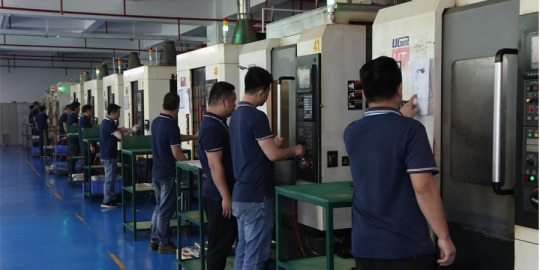
View On WordPress
1 note
·
View note
Text
CNC Machining Manufacturer in Pune – ANJALI T. PRECISION

In the ever-evolving world of manufacturing, precision, efficiency, and innovation have become the pillars of modern industry. Pune, often referred to as the engineering and manufacturing hub of India, is home to several leading CNC machining companies. Among them, ANJALI T. PRECISION stands out as a trusted name in the field of CNC Machining and precision components manufacturing.
Who We Are – About ANJALI T. PRECISION
Established with a vision to deliver world-class CNC machining services, ANJALI T. PRECISION has earned a solid reputation as a leading CNC Machining Manufacturer in Pune. Our company is known for its commitment to quality, advanced technological infrastructure, and client-centric approach. With years of industry experience, we have been consistently delivering high-precision, complex, and cost-effective components to diverse industries including automotive, aerospace, electronics, defense, and industrial equipment.
What is CNC Machining?
CNC (Computer Numerical Control) Machining is a subtractive manufacturing process where pre-programmed computer software dictates the movement of factory tools and machinery. It enables the creation of precise and complex parts with tight tolerances and smooth finishes.
At ANJALI T. PRECISION, we specialize in:
CNC Turning
CNC Milling
VMC (Vertical Machining Center) operations
Drilling and Tapping
Custom CNC Machining Solutions
Our Services
1. CNC Turning and Milling
Our state-of-the-art CNC turning and milling machines produce high-accuracy components for critical applications. We work with a wide range of materials including stainless steel, aluminum, brass, copper, and various engineering plastics.
2. Prototype to Production
Whether it's a single prototype or full-scale production, we have the expertise and resources to support both short-run and high-volume requirements.
3. Custom Component Manufacturing
We specialize in customized parts as per client drawings and specifications. Our skilled engineers and machinists ensure top-notch output at every stage.
4. Quality Inspection and Assurance
Our in-house quality control processes include 3D measuring tools, surface roughness testers, height gauges, and other advanced inspection instruments. We strictly follow ISO quality standards to ensure zero-defect products.
Why Choose ANJALI T. PRECISION?
✔ Advanced Infrastructure
Our modern manufacturing facility in Pune is equipped with cutting-edge CNC machines and tools, allowing us to meet the most demanding machining requirements.
✔ Experienced Workforce
We have a team of highly trained engineers, CNC programmers, and operators who are passionate about delivering perfection.
✔ On-Time Delivery
We understand the importance of deadlines. Our streamlined workflow ensures timely deliveries without compromising on quality.
✔ Competitive Pricing
By optimizing our operations and processes, we offer the most competitive rates in the industry.
✔ End-to-End Solutions
From design review and raw material sourcing to machining, finishing, and final inspection – we offer complete CNC machining solutions under one roof.
Industries We Serve
Automotive
Aerospace
Medical Equipment
Defense & Military
Textile Machinery
Robotics & Automation
Electronics & Electrical
Heavy Engineering
Customer-Centric Approach
At ANJALI T. PRECISION, every client is important. We believe in building long-term partnerships based on trust, transparency, and technical excellence. Our support team ensures clear communication, quick response times, and personalized services to meet your project goals.
CNC Machining in Pune – The ANJALI T. PRECISION Advantage
Pune’s strategic location, skilled workforce, and proximity to major OEMs make it an ideal hub for CNC machining. With ANJALI T. PRECISION, you're not just hiring a manufacturer; you're partnering with a team that is committed to engineering excellence and precision craftsmanship.
Contact Us
ANJALI T. PRECISION – CNC Machining Manufacturer in Pune 📍Address: Gate 1652, 3M Industrial Estate, 1652, Dehu - Alandi Rd, Patilnagar, Chikhali, Pimpri-Chinchwad, Maharashtra 412114 📞 Phone: 092256 34833 📧 Email: [email protected] 🌐 Website:https://www.anjalitprecision.com/
Looking for a Reliable CNC Machining Partner in Pune?
Contact ANJALI T. PRECISION today and let us help you turn your designs into high-quality, precision-engineered reality.
#CNC Machining Manufacturer in Pune#CNC Machining Services Pune#Precision CNC Components#CNC Turning and Milling Pune#Custom CNC Parts Manufacturer#VMC Machining Services#CNC Job Work Pune#CNC Precision Engineering#Anjali T. Precision Pune#CNC Components Supplier India.
0 notes
Text
Mastering Robot Parts CNC Machining: Aluminum Vs Stainless Steel: Selecting the Appropriate Material for Robot Parts
Introduction
CNC machining can be an intensely competitive industry. When fabricating precision robot parts, choosing materials plays a pivotal role. Manufacturers such as Shenzhen Yixin Precision must balance weight, durability, cost and machinability when choosing between aluminum and stainless steel when selecting their material choice for robot chassis to joint flanges fabricated using CNC. This article explores both materials thoroughly while offering actionable insights for selecting robot parts CNC material options as well as detailing robot CNC machining nuances.
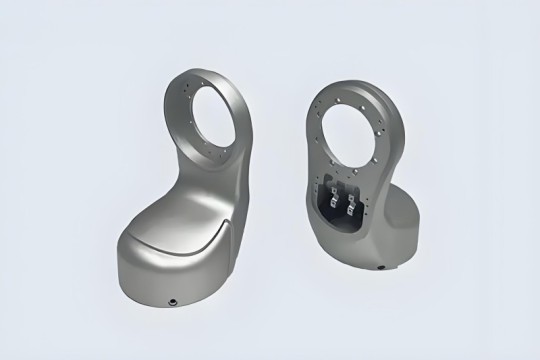
Why Material Selection Matters
Selecting the proper material for robot parts is more than a technical decision; it impacts performance, safety, and long-term reliability of the final product. Critical factors to keep in mind include:
Weight and Strength: Lightweight materials such as aluminum can significantly reduce overall weight, improving mobility and energy efficiency, while at the same time load-bearing components like robot joint flanges require superior strength to withstand their loads.
Corrosion Resistance: Robots must operate in challenging environments. Stainless steel offers excellent corrosion resistance, making it the ideal material to use in harsh or moisture-rich settings.
Machinability & Production Efficiency: Machinability plays an essential role in production time and costs, with aluminum's excellent machinability making CNC robotic part machining faster cycle times possible.
Thermal Conductivity: Robotics applications requiring high speeds or performance demand the ability to dissipate heat quickly are crucial, while this aspect must also be carefully managed in terms of thermal conductivity.
Cost Implications: Material costs and associated machining processes should be carefully evaluated against their performance benefits.
Understanding these factors is crucial to making informed decisions when selecting materials for robot parts. mes Aluminium for Robot Parts:
Advantages and Drawbacks Advantages of Aluminum
Advantages of Aluminum
Lightweight Nature and High Strength-to-Weight Ratio
Aluminum is renowned for being significantly lighter than stainless steel. This makes it a popular choice for applications where reducing weight is crucial—such as in robot chassis or robotic arms. A lower weight contributes to better energy efficiency and increased maneuverability without sacrificing structural integrity.
Superior Machinability
In the realm of robot parts CNC machining, aluminum stands out due to its excellent machinability. Its softness allows for faster cutting speeds and reduced wear on machining tools, leading to shorter production cycles and lower overall manufacturing costs.
Adequate Corrosion Resistance
Although not as resistant as stainless steel, aluminum naturally forms an oxide layer that protects against further oxidation. In controlled environments with minimal exposure to corrosive agents, aluminum remains a viable option.
Effective Thermal & Electrical Conductivity
Aluminum’s ability to conduct heat efficiently is advantageous in designs where heat dissipation is critical. This can be especially important in high-speed robots or in components where temperature regulation is essential.
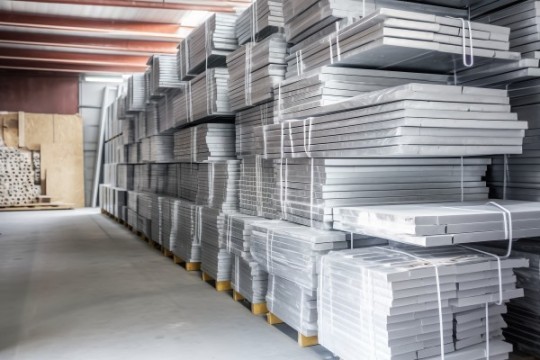
Drawbacks of Aluminum
Lower Hardness and Wear Resistance:
Compared to stainless steel, aluminum can be more susceptible to wear and abrasion. In applications where components are subject to constant friction, aluminum may experience faster degradation.
Limited Performance Under Extreme Conditions:
Aluminum may not perform as reliably in high-temperature environments or in situations involving heavy loads. This limitation makes it less suitable for certain critical load-bearing parts.
Stainless Steel for Robot Parts: Strengths and Limitations
Advantages of Stainless Steel
Exceptional Strength and Durability
Stainless steel is highly valued for its robustness. Its superior mechanical properties make it the material of choice for parts that require high load-bearing capacity, such as robot joint flanges and industrial robot chassis. The durability of stainless steel ensures that components can withstand substantial stress and strain over extended periods.
Unmatched Corrosion Resistance
One of the most significant advantages of stainless steel is its exceptional resistance to corrosion and rust. This property is indispensable for robots operating in harsh or corrosive environments—such as marine robotics, outdoor industrial settings, or even medical applications.
Enhanced Wear Resistance
Due to its higher hardness, stainless steel offers better resistance to wear and surface damage. This quality is critical for components that are in constant motion or friction, ensuring longevity and sustained performance.
High-Temperature Stability
Unlike aluminum, stainless steel retains its strength and structural integrity at elevated temperatures. This makes it the preferred material for robots used in high-heat applications or environments where thermal stress is a concern.
Limitations of Stainless Steel
Higher Density and Weight:
The greater mass of stainless steel can be a disadvantage in applications where minimizing weight is essential. This increased weight may affect the overall energy efficiency and agility of the robot.
Challenging Machinability:
Stainless steel is more difficult to machine than aluminum. The increased hardness requires specialized tooling and can extend cycle times in robot parts CNC machining, ultimately raising production costs.
Lower Thermal Conductivity:
While stainless steel excels in strength, its ability to dissipate heat is less efficient compared to aluminum. This could be a drawback in applications where managing heat is critical.
Comparative Analysis: Aluminum vs Stainless Steel For A side-by-side comparison of aluminum and stainless steel for robot parts offers clarity on which material is best suited for specific applications:
Criteria
Aluminum
Stainless Steel
Weight
Lightweight; enhances mobility
Heavier; can affect energy efficiency
Strength
Good strength-to-weight ratio
Superior mechanical strength and durability
Machinability
Excellent; reduces CNC machining time
Challenging; requires more time and specialized tools
Corrosion Resistance
Adequate in controlled environments
Exceptional; ideal for harsh or corrosive environments
Thermal Conductivity
High; beneficial for heat dissipation
Lower; may require additional cooling solutions
Cost
Lower production and machining costs
Higher production costs due to complex machining
This table serves as a quick reference for engineers and procurement specialists responsible for material selection for robot parts. Ultimately, the choice between aluminum and stainless steel depends on the requirements and operating conditions for each robot design and operating condition.
Application Scenarios and Recommendations
1.Robot Chassis and Robotic Arms
Aluminum is often the go-to material for robot chassis and arms that must reduce weight, due to its superior machinability and cost-effectiveness. Aluminum's lightness also makes it suitable for high speed production applications with rapid production requirements. o
Stainless Steel can be utilized in heavy-duty industrial applications due to its greater strength and durability, offsetting its additional weight by being suitable for robot joint flanges and load-bearing components.
2.Robot Joint Flanges and Load-Bearing Components
Components like robot joint flanges require materials that can withstand repeated mechanical stress, with stainless steel typically taking the lead due to its high tensile strength and wear resistance. o
Where weight is an important consideration but load-bearing capacity must still be ensured, advanced aluminum alloys with increased strength may be an appropriate solution.
3.Precision CNC Machining Requirements
Aluminum's ease of machining offers significant advantages for parts that require intricate detailing and high precision, with faster cycle times and lower tool wear contributing to overall production efficiency.
When precision is essential and components must remain functional over their lifespan, stainless steel's robust nature may justify an increase in machining complexity.
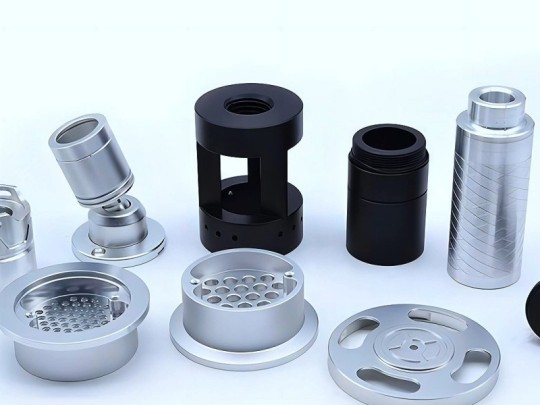
Considerations in Robot Parts CNC Machining
CNC machining plays a critical role in determining the final quality of robot parts, so its impact must not be overlooked. Some key considerations of this process are:
1.Tool Wear and Maintenance:
Machining stainless steel can cause increased tool wear due to its hardness. This leads to higher maintenance costs and longer downtimes, while aluminum's softer nature extends tool life, leading to greater productivity for robot parts CNC machining.
2.Precision and Tolerance:
Acquiring tight tolerances is of utmost importance in robot components, particularly joints flanges. Both materials require different approaches when it comes to milling to achieve similar precision levels; advanced CNC machines with real-time monitoring systems can mitigate issues related to either material.
3.Surface Finishing:
Post-machining surface treatments are an integral component of success. Aluminum may undergo anodizing to improve corrosion resistance and aesthetic appeal; for stainless steel products, polishing or passivation might provide a smooth rust-resistant finish.
4.Heat Management:
Machining processes generate heat that must be managed effectively to avoid damaging machinery. Aluminum's high thermal conductivity helps disperse it quickly while stainless steel requires more advanced cooling solutions during CNC machining processes.
Innovations in Material Science and CNC Machining
Advancements in material science have seen the creation of aluminum alloys and stainless steel grades tailored specifically for CNC applications, offering improved strength, corrosion resistance, and optimized machinability properties that manufacturers are increasingly adopting to meet growing demand for high-performance robot parts.
CNC machining technology has rapidly advanced over time with features like automated tool changers, real-time monitoring systems and sophisticated software algorithms, offering more precise control of the machining process while reducing production errors and further refining final product quality for both aluminum and stainless steel components.
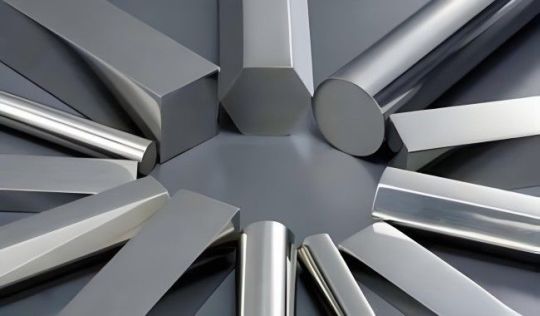
Future Trends in Robot Material Selection
As robotics technology develops, so will material selection criteria. Some key trends to keep an eye on:
Hybrid Materials:
Combinations of aluminum and stainless steel materials in an assembly may provide an advantageous balance. For instance, lightweight aluminum components could be reinforced by stainless steel reinforcement elements where durability is key.
Sustainability:
Environmental considerations have become ever more paramount, and materials that promote sustainability with lower energy needs during production and increased recyclability are rapidly growing in popularity.
Customization Through Advanced Alloys:
Continued research in metallurgy is yielding advanced alloys designed specifically to meet high precision applications, which may provide better performances during robot parts CNC machining thereby further optimizing cost and efficiency.
Conclusion
Selecting aluminum or stainless steel as the material of choice for robot parts involves multiple considerations. Aluminum excels when lightweight design, rapid production, and cost efficiency are top priorities; particularly in applications requiring CNC machining of robot chassis components. On the other hand, when strength, durability, and corrosion resistance are vital (particularly load bearing elements such as joint flanges), stainless steel provides more reliable solutions.
#cnc machining#cnc machining service#custom cnc parts#robot parts#robot parts manufacturing#shenzhenyixinprecision
1 note
·
View note
Text
#aluminum machining near me#custom-cnc-aluminum-parts#cnc-components-manufacturers#stainless-steel-cnc-machining-services#precision-machined-components-manufacturers
0 notes
Text
IMPORT CNC MACHINES FROM JAPAN
Why Import CNC Machines from Japan? Japan remains one of the most trusted sources of high-precision CNC machinery globally. Indonesian manufacturers in automotive, aerospace, metal, and plastic industries frequently import CNC lathe machines, machining centers, and CNC milling machines from Japan for their accuracy, efficiency, and reliability. However, importing machines requires legal…
#CNC import Indonesia#CNC lathe import service#CNC lathe Japan#customs clearance CNC#customs CNC import Indonesia#HS code 8458#import CNC machine#Japan CNC import#Keenam International#legal freight forwarding#machining center import
0 notes